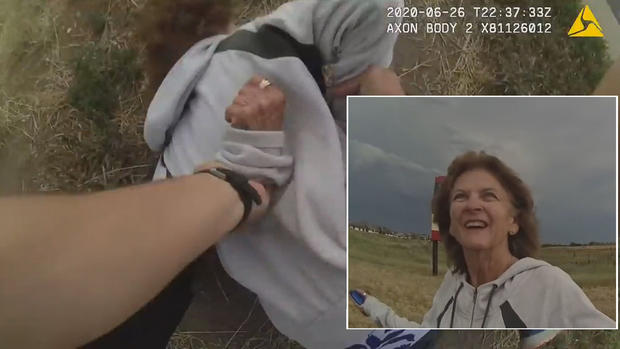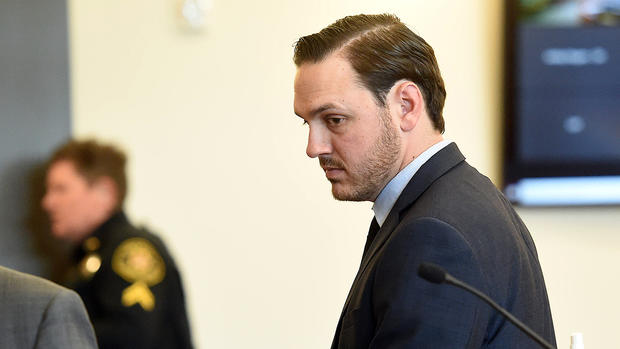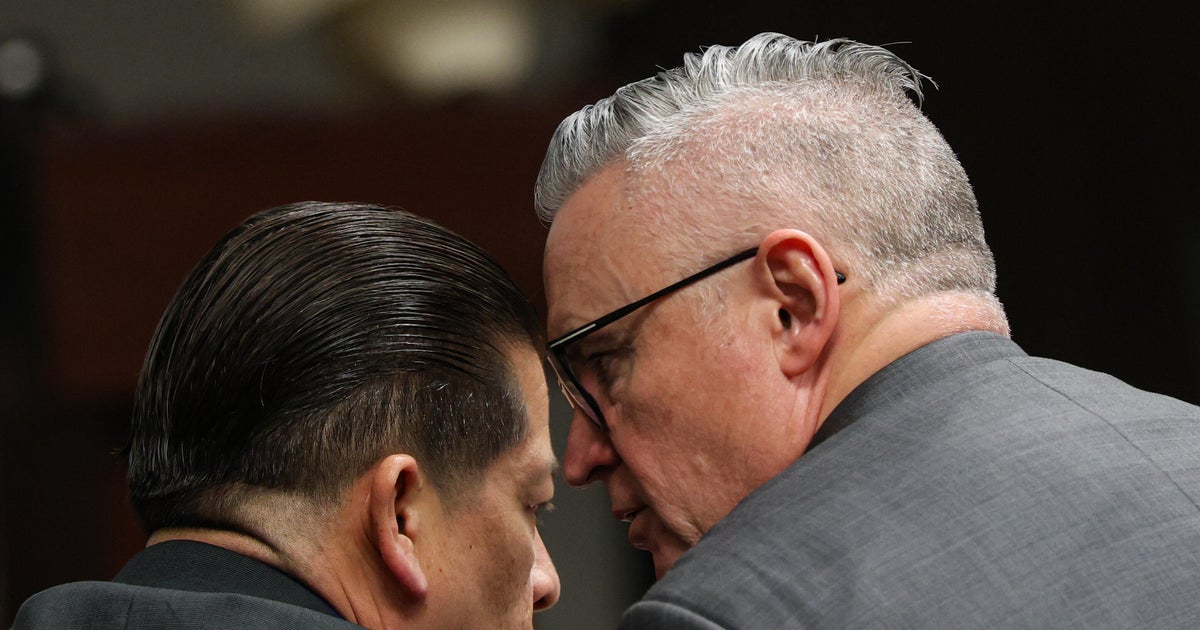Judge sentences former Loveland Police Officer Daria Jalali for 'abysmal failure to protect and serve'
A former Loveland police officer is now the second officer to be sentenced by a court for her role in the rough arrest of Karen Garner, a woman living with dementia. Daria Jalali, the second officer to respond to a call involving Garner, previously pleaded guilty to a charge of Failure to Intervene.
Jalali was sentenced to 45 days in jail, 36 months probation and 250 hours of community service. She was also sentenced to undergo a mental health evaluation and must avoid contact with the Garner family while also maintaining employment of at least 35 hours per week.
The charges stem from the 2020 arrest of Karen Garner by former officer Austin Hopp. Hopp was dispatched to a local Walmart on the report of attempted shoplifting. Garner, who returned the items before leaving the store, was thrown to the ground by Hopp after failing to comply with orders to stop walking. She is heard repetitively telling Hopp she was going home, advocates for those living with dementia say her confusion was apparent and should've changed how Hopp and Jalali responded.
Hopp, who is now serving time behind bars for breaking Garner's arm, separating her shoulder and spraining her wrist.
Jalali was charged with her failure to intervene with Hopp's actions and also her failure to report injuries as Garner sat in a nearby cell for hours without medical attention.
Failure to Intervene is a relatively new charge created in recent years in Colorado.
The maximum sentence of failure to intervene comes with up to 60 days in jail and five years of probation.
Jalali, who sat in the courtroom wearing black pants and a light purple shirt, was forced to spend 12 minutes rewatching the body camera footage from the day of the 2020 arrest. Jalali didn't appear to show emotion as the video played including the moment her comment of "I'm a little bloody and a little muddy but that's how it works," comment was played. Garner's family sat in the first row in the courtroom wiping tears from their eyes as this final chapter of their mother's case came to an end.
Jalali's defense spoke to the judge saying that her personal records of employment show she didn't know better due to a lack of training and accountability from Loveland Police. Her lawyer argued that the department's willingness to allow her to continue to patrol when she wasn't qualified for the job was partially to blame for her actions the day of Garner's arrest.
Her lawyer argued that a neurological evaluation of Jalali showed she wasn't mentally capable of processing verbal and visual content at a rapid enough pace to handle the situation as it unfolded. "Her actions in this case were not malicious or intentional," her lawyer said.
Jalali's lawyer also said accusations that her client was not remorseful were inaccurate. She asked that Jalali's cognitive deficits be weighed when it came to the judge's sentencing.
"The trajectory of her life has dramatically changed," her lawyer said as she asked for 18 months of probation with no jail time.
The prosecution was quick to tell the judge they felt Jalali's actions were not the result of a lack of training or a mental deficiency, but rather a lack of human decency. The district attorney's office argued that the Garner family's request for at least three years of probation, and added jail time was warranted. The prosecution asked for a straight jail sentence of 60 days behind bars.
"(Jalali) did nothing but to help," the prosecution shared to the court.
Jalali, as the defendant, was given the opportunity to speak to the judge and the courtroom before sentencing.
"I've always been someone with the best intentions," Jalali said. "I truly did get into the line of work to serve the community."
Jalali said that she arrived on the scene to find her partner saying that Garner was resisting arrest. She said she approached without knowledge of what may have happened before. She noted that she asked Garner multiple times if she was in need of medical attention, but felt Garner was simply being defiant by not responding h.
"I hurt others and I am sorry about that," Jalali said. "There is nothing I want more than to go back in time and fix this."
Jalali said she initially felt that Garner was intoxicated and not suffering from dementia.
"I wish I would have just called medical services to check her out," Jalali said. "We should not have kept her in (the cell without medical attention.)"
Jalali told the judge that she believed Garner was just complaining about the tightness of the handcuffs when she said she was in pain. She told the judge she felt she was helping Garner by adjusting the handcuffs.
Describing herself as possibly naive and immature, Jalali apologized to Garner and her family.
The judge said he did not watch any news coverage of the Garner arrest and that he only watched the content provided in court during her hearing.
However, after reviewing the content and the body camera footage, the judge said he "gets stomachaches" watching the body camera footage. He said he felt sick to the stomach reading the evidence in the case.
"The photos and the video blows that up, magnifies it. It really shows you, my God this is just not a little person...this was a delicate, very fragile elderly woman," the judge said.
The judge said he has watched many videos over the years of police takedowns, yet felt the footage from Garner's arrest was excessive. He noted that Hopp's actions were more concerning overall, calling them incomprehensible.
"This really does make your stomach clench when you see it. This was a person who was clearly confused. Clearly didn't understand what was going on," the judge said. "This isn't something where I can see how someone in the heat of the moment thought this was appropriate."
"What happened in June of 2020 was an abysmal failure. It was incomprehensible. It was an abysmal failure of that duty to protect and serve," the judge said. "As soon as you touched her you should have thought maybe this is someone we should be (careful with.)"
The judge credited Jalali with repetitively asking Garner if she needed medical attention, but scolded her for not using common sense to realize that Garner needed the help without verbalizing it.
"You have to remember this went on for two hours," the judge said.
A woman who entered the courtroom with Jalali, and who sat behind her in the first row of the courtroom, was seen wiping away tears during the judge's comments.
"I can't comprehend how anybody would be proud or excited about this arrest," the judge said, referencing Hopp and Jalali fist bumping after the arrest.
Garner's children sat in the court room during the judge's comments at times nodding their heads, audibly agreeing and even smiling at times when the judge acknowledged points they have argued for years.
"A law enforcement officer's job is to protect and serve. What you did that day was clear that you were more concerned with protecting yourself and officer Hopp," the judge said.
The judge suggested that Jalali's lack of actions to help Garner that day may have been dogged by her romantic involvement with Hopp.
"This whole thing was tragic. It never should have happened," the judge said.
As part of a plea agreement, Jalali promised to never apply for another law enforcement job either public or private.
Loveland Police Department Interim Police Chief Eric Stewart has issued the following statement regarding the sentencing of former police officer Daria Jalali: "The Loveland Police Department appreciates the diligence and professionalism of the District Attorney's office in the pursuit of justice and due process in this case. As in the prior sentencing of former officer Austin Hopp, this verdict does not change Ms. Garner's wrongful and illegal treatment or the pain she and her family have experienced. I do hope this brings the next level of closure for Ms. Garner and her family."













